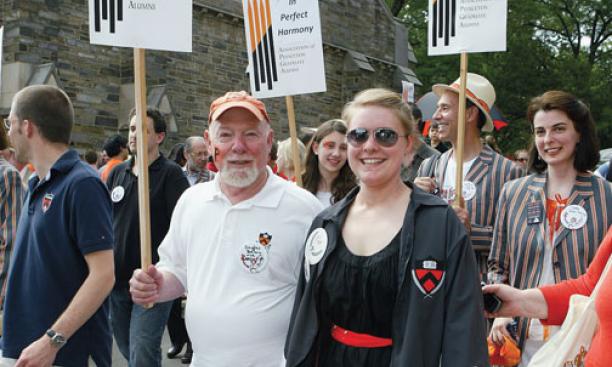

The University should invest long-term in treating graduate students and alumni equitably with their undergraduate counterparts, a study group recommended in a strongly worded report issued during Reunions.
“Graduate students and graduate alumni should be valued as an integral part of the University community with full citizenship rights and benefits,” the Commission on Graduate Alumni Relations said in a 24-page report. Among its recommendations:
• The number of graduate alumni on the University’s 40-member Board of Trustees — three in recent years — should increase to 10 to reflect the proportion of graduate alumni (28 percent) among the alumni body.
• With the stereotype of grad students as “second-class citizens at Princeton” still lingering, the University should provide housing and gathering spaces for grad students “comparable to those for undergraduates in both quantity and quality.”
• Because the primary connection of graduate alumni to Princeton tends to be through their departments or schools, those academic units should “ramp up” their outreach to grad alumni. The report praised the Woodrow Wilson School and the history and economics departments for strong ties with their graduate alumni.
• Events held at times other than Reunions may be more likely to bring graduate alumni back to campus. The report cited the Wilson School’s Graduate Alumni Weekend, held in April, and said one possibility would be for departments to create a “renaissance weekend” that would “showcase the intellectual life of the University.”
While Princeton is a leader in its engagement of undergraduate alumni, graduate alumni are “considerably less engaged,” said commission chairman Peter D. Bell *64 p*04, a senior research fellow at Harvard’s Hauser Center for Nonprofit Organizations.
The University has made advances in graduate-alumni relations, Bell said, but more action is necessary to “enrich the careers and lives of graduate alumni while strengthening the University at the same time.” He noted, for example, that if departments pursue a stronger connection with their graduate alumni, then the alumni can help by encouraging strong students to apply and by assisting graduates in finding jobs, especially outside academia.
The commission said that taking the steps would require “a substantial and sustained investment of time and money over the next five to 10 years,” but said this would offer “significant upside potential for the University.”
President Tilghman said she agreed with several of the report’s key premises, and said she planned to appoint a working group over the summer to develop an implementation plan.
Graduate School Dean William Russel and alumni leaders also expressed support for the report while noting that details will need to be worked out.
The commission, which was created by the Association of Princeton Graduate Alumni (APGA), found that responsibilities for working with graduate alumni currently are divided and marked by “insufficient staffing, overlapping missions, and inconsistent faculty outreach across departments.” The report calls for a broader role for the Graduate School and more defined missions for the APGA and for the Alumni Council’s Graduate Alumni Relations Committee.
Tilghman said that the University has begun a multiyear process of improving the quality of graduate student housing, saying much of the existing stock is “substandard.” Russel said the University is preparing to tear down the Hibben-Magie apartments and build several hundred units of graduate-student housing on the site, partnering with a private developer who would start construction in 2012 and complete the project two years later. The Butler apartments then would be torn down.
